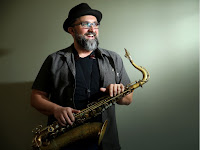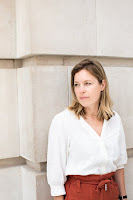Since the band's inception, Scott and Herring have been the principal composers. They both know the strengths of each band member and their compositions play to that as well as pushing them to continue to grow. Album #5 is a two-disk set: "Irrational Revelation and Mutual Humiliation" (self-released), is the third consecutive Peripheral Vision album to be co-produced by the composers with Jean Martin (drummer and former member of pianist D.D Jackson's Trio) and the first to feature other musicians (see list below). While the extra "voices" fill out the sound, it does not take away from the group interactions. The first album's centerpiece is Herring's "Reconciliation Suite", a nearly 14-minute suite composed after the death of bassist's grandfather. The story behind the music not only deals with reconciliation in families (especially multi-faith families) but also the role of Canadian citizens and artists to deal with how that country deals with members The First Nation and immigrants. It's an extremely powerful work, deserving of multiple listens to grasp its complete message. The music rocks, roars, soars, whispers, sings, and cries
The 14-song, 88+-minute, album is loaded with excellent music. Pieces such as "For Kent Monkman" (Herring) swings with great intensity while "Man vs Zafu" is a fascinating take on a relationship the composer (Herring) has with his Yoga mat. The bassist's "Brooklyn Bearded" is a funky response to a gig composer Herring saw in that borough – Fraser's dancing drums will delight you and make you move. Scott's "Title Crisis" is a response to the untitled songs the guitarist/ composer would bring to sessions and have the band give them ridiculous names. The sound manipulation on Hogg's tenor sax during his solo gives him an eerie feel but Fraser's powerful drum accompaniment pushes the music forward. "N12" refers to an eviction notice Scott received as Toronto was gentrifying his neighborhood – the subsequent "dislocation" gave birth to this song in which the composer displays both anxiety and calmness. Scott's studies with drummer-composer John Hollenbeck laid the ground work for "Schleudern" (German for "spin" or "fling"), a piece that sonically refers to the teacher's Claudia Quintet (thanks to the work of guest Michael Davidson's vibraphone!)
"Irrational Revelation and Mutual Humiliation" refers to the title of each of the 2-CDs in this set and I'll leave up to you to decide what or if there is a difference between the two. What you do get when you truly listen is music that is intelligent, smartly orchestrated, witty, muscular, and emotionally powerful. On initial hearing, one may pick out connections to the music of John Abercrombie, Pat Metheny, and the afore-mentioned John Hollenbeck; yet Peripheral Vision is, after 12 years, its own entity with music that stands out for the quality of its compositions and splendid musicianship.
For more information, go to peripheralvisionmusic.com. To listen to more of this album and check out the Quartet's entire discography, go to https://peripheralvision.bandcamp.com.
Here's the opening track:
Personnel:
Trevor Hogg - tenor saxophone
Don Scott - guitar
Michael Herring - bass
Nick Fraser - drums
GUEST MUSICIANS
Michael Davidson - vibraphone (eight tracks)
Craig Harley - organ, Fender Rhodes (five tracks)
Chris Pruden - Prophet 6 (six tracks)
Jean Martin - organ bass, synth programming (two tracks)
Songs of Tales is a truly trans-Canadian group in that each member of the quartet lives in a different location. Petr Cancura (tenor saxophone, keyboards) resides in Ottawa, Gordon Grdina (guitars, oud, bass) in Vancouver BC, Jesse Zubot (violin, synth, bass, congas) on Vancouver Island, and Jean Martin (drums, electronics, vibraphone) in Toronto. Zubot and Martin (who co-produces the quartet Peripheral Vision) are both members of throat singer Tanya Tagaq's Trio while Grdina leads several groups (he has released or been featured on, at least four albums that have come out in the first five months of 2020). Cancura is currently the Program Director of the Ottawa Jazz Festival and a member of the Canadian quartet Way North (with bassist Michael Herring, drummer Richie Barshay, and trumpeter Rebecca Henessey) – he also is an accomplished mandolin player and a graduate of the New England Conservatory of Music.
The band's debut album, "Life Is a Gong Show" (released on Cancura's labels Roots2Boots Records), displays the myriad influences on the musicians. With the exception of Charles Mingus's "Moanin'", all the songs were composed by band members (save for Martin) but each member had a hand in the arrangements and the sonic environments. The Mingus tune opens with video game machine sound effects before Cancura's overdubbed saxophones and Grdina's electric guitar play the melody. Martin's thumping drums sets the pace, the guitar takes on a raucous tone as the synth tones dance for one speaker to the next and back. The tenor solo is a bit frantic and shells to bump up the intensity even more.
The final two tracks on the album, "Sideways" and "Mary Go Round", are both Cancura (pictured left) compositions, both as different as day and night. The former sports a dancing melody line, repeated over and over through the first two minutes until the music breaks down and becomes a series of long tones out of which rhythmic conga beat bring the listener back to the repetitive melody. The latter piece opens as if a orchestra was tuning up, quietly and slowly moving forward out of rhythm. Disparate sounds filter in and out, long violin tones, hint of marimba, and a melody line trying to emerge. All of a sudden, acoustic guitar and violin introduces a plaintive time with quiet explosions and counterpoint from tenor saxophone. It's a lovely close to a fascinating program.
In these odd days, "Life Is a Gong Show" is an apt title for the daily machinations of beleaguered people. Even though Songs of Tales recorded the album months before the shutdown, this noisy, contemplative, crackling, rhythmical, and fun music feels just right. Call it jazz, call it fusion, world music but let these 11 tracks seep into your brain and enjoy!
For more information, go to https://roots2boot.com/life-is-a-gong-show.
Time to listen:


















































